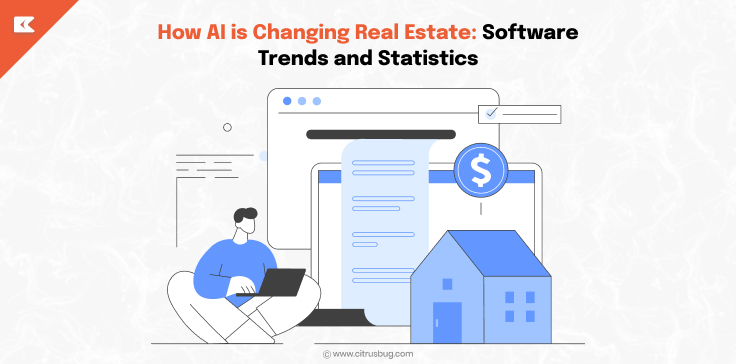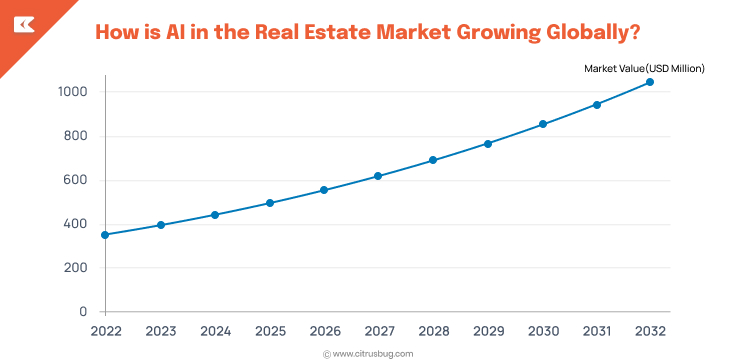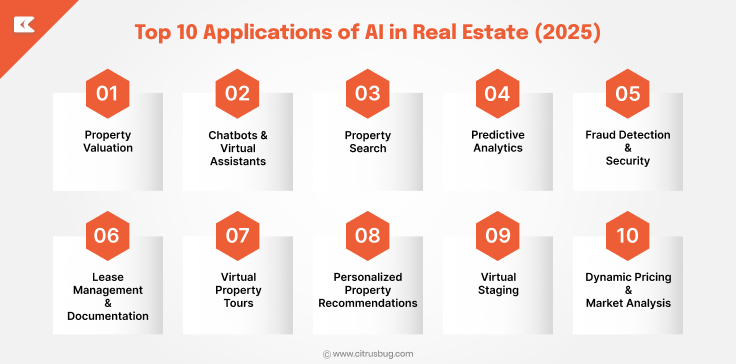How AI is Changing Real Estate: Software Trends and Statistics
- July 28, 2025
-
2249 Views
- by Ishan Vyas

In 2025, artificial intelligence (AI) is expected to transform the way the real estate business operates, from top to bottom. If you’re looking to buy your first house or rent an apartment or manage a multitude of properties, AI is now a part of the entire process. Imagine searching for a house and a system that instantly shows you homes that match your style, budget, and preferences for location. With the growth of real estate software development, these innovative solutions are now integrated into numerous platforms that sellers, buyers and property managers use all the time.
As per the most up-to-date AI in real estate statistics, More than 70% of real estate professionals in the developed market employ at the very least one AI-powered tool within their work. The most exciting aspect? AI doesn’t replace humans, but it assists them. The year 2025 is the time for AI can transform an experience that was once a lengthy and stressful process into a smoother and more efficient experience for all who are involved.
What Is Covered Under AI In Real Estate Market?
Artificial intelligence is now a part of nearly all aspects of real estate. From finding the perfect home to managing buildings and guiding investment decisions. AI-powered tools for market forecasting and estimation analyse a wide range of data, including local sales, economic indicators, and renovation histories, to provide accurate and rapid price estimates. Property values that are based on AI tools sell 3 to 5% more than the average price, and investment firms that use predictive AI outperform their market by 4 to 7% per year.
AI in real estate also powers chatbots and smart virtual assistants that provide answers to homebuyers’ questions instantly, around the clock. Recent AI in Real Estate statistics show that about 75% of real estate brokerages have integrated AI into their operations.
Almost 80% of real estate agents use AI-based tools like lead scoring and chat support. These assistants schedule property viewings and answer FAQs. They also streamline the early conversations. This allows human agents to focus more on developing relationships and closing deals.
North America will lead AI adoption in the real estate sector in 2024. It is expected to account for 38.5% and 41% of revenues in this area, due to continued investment and technological innovations. As more companies look for smarter ways to manage properties, the demand for advanced property management software development is also rising, helping the industry move toward more efficient and data-driven operations.
How is AI in the Real Estate Market Growing Globally?
AI is a growing trend in real estate because it allows people to save time, reduce costs and make better choices. AI makes real estate more efficient and effective, whether it is by using virtual tours for showing homes, predicting the price of property, or using energy-saving systems. AI is now being used by more companies in the real estate industry.
Let’s take a look at some important AI in real estate statistics to understand how much impact it’s having and why more people are starting to rely on it.
“The AI market for real estate is rapidly growing. It was valued at $2.9 billion in 2024 and is expected to grow to $41.5 billion by the year 2033. The market is growing strongly at 30.5% per year, which is the reason for this big leap.”
Indeed, the AI housing market might initially be modest, but it’s expanding rapidly. In 2024, the market was valued at $2.9 billion. By 2033, it’s predicted to increase by more than 14 times, bringing it to $41.5 billion.
The rapid growth in this area is because more real estate companies are making use of AI tools to control structures, analyze market data, and assist buyers in finding the best homes quickly. It’s among the most significant real estate technology trends that are altering the way the industry operates currently.
“In 2022, the intelligent AI market for real estate was estimated to be $351.9 million. Experts predict that it will continue expanding at a steady rate and could be around $1,047 million by 2032. This means that more real estate firms are likely to begin using AI tools in the next years to make their work more efficient.”
This graph shows how the generative AI property market is expanding steadily. It was first seen in 2022 at $351.9 million. It is projected to grow to $1,047 million in 2032, growing at 11.52 percent each year. This steady growth indicates the increasing number of real estate firms using generative AI tools like virtual staging, as well as 3D designs of property, to be more efficient and connect more effectively with their clients. Based on recent AI in real estate statistics, this trend is only going to increase. Understanding generative AI can help explain why these tools are essential to modern-day real estate.
Generative AI can be used to produce things like virtual tours of homes, 3-D models, and appealing home listings. In 2022, it was estimated that the demand for this kind of AI was estimated as $351.9 million. In the coming ten years, the market is expected to continue growing and will increase to around $1,047 million in 2032.
The steady increase in demand shows that virtual staging tools and AI-generated home previews are increasingly essential to real estate professionals as well as developers. They can help properties stand out and provide buyers with more information about what they can expect.
“The AI market in real estate is estimated at around USD 163 billion by 2022. The figure is expected to grow to USD 226 billion by 2024. This is an increase of more than 37%”
In a single year, the market has grown between $163 and $226 billion, a growth of 37%. This rapid growth is mostly because more real estate firms are utilizing AI to reduce expenses, make better decisions and provide better services.
Tools such as price prediction and automated chat support help businesses operate more efficiently and communicate with their customers more effectively. AI is becoming an integral element in how the real estate business operates now.
Top 10 Applications of AI in Real Estate (2025)
1. Property Valuation
AI now transforms how we estimate property values. Instead of relying on a few recent sales and manual appraisals, AI valuation tools scan thousands of data points, including location, market trends, and property features, and deliver results in minutes. According to AI in real estate statistics, these tools typically arrive within just 3% of the final fair value, far more accurate than older methods.
Many real estate professionals now trust AI-based estimators, since they greatly reduce room for error and speed up the pricing process. Sellers get confidence in their listing price, while buyers can make offers knowing they’re in a fair range. It’s a smarter, fairer way to value properties and it’s becoming standard practice.
Key Benefits of AI-Based Valuation
- Analyzes large datasets quickly for precise results
- Reduces human bias and pricing mistakes
- Delivers almost real-time valuation updates
- Speeds up decision-making for agents and buyers
- Builds confidence with transparent, data-driven pricing
2. Chatbots & Virtual Assistants
AI-powered chatbots are now an effective tool for Real Estate companies. They can answer as many as 80% of customer queries immediately, even if agents aren’t around, helping buyers schedule tours and receive information immediately. With these assistants, homeowners don’t have to wait around for office hours. They can seek answers to questions anytime, making the entire process smoother and enjoyable.
They go beyond basic chat, they collect important information such as budget, preferences regarding location and timelines for moving in, and send the best prospects to real estate agents. Based on AI in real estate statistics, AI chatbots boost lead follow-up rates by approximately 65%, allowing agents to concentrate on customers who are serious about their business. Thanks to the growing demand for AI chatbot development, more real estate businesses are now using these smart tools to save time, build better client relationships, and close more deals.
Key Benefits of AI Chatbots
- Answers 24/7 without human help
- Captures and qualifies leads automatically
- Saves up to 65% on follow-up time
- Gathers customer preferences early
- Helps agents focus on serious buyers
3. Property Search
AI is helping to locate homes that are exactly what people are searching for. Instead of searching through a myriad of properties, AI-powered search tools analyze your budget, location preferences and essential features and then provide you with the most suitable properties. Platforms that employ AI-driven property search will increase the engagement of users by as much as 25% since they can make searching more efficient and relevant.
These tools are also able to support features like virtual tours as well as individual recommendations based on your previous behavior. This helps customers feel better about their decision-making and also gives agents the ability to present the best options in a short time. It’s an upgrade that buyers and agents alike are happy with.
Key Benefits of AI Property Search
- Shows listings that match buyer preferences automatically
- Increases browsing engagement by 25%
- Recommends off-market or hidden gems
- Supports virtual tours for better viewing experiences
- Speeds up the home-finding process
4. Predictive Analytics
Predictive analytics employs AI to predict the future of property trends and risks using historical data as well as current market indicators. It aids real estate professionals in understanding the future of rent income, vacancy risk and price shifts. Predictive analytics could reduce the occurrence of vacancies by 35% and increase the ROI of real investment in real estate by 23%.
This technology isn’t just for investors; it’s also a game-changer for property managers and agents. AI-powered models are able to predict lease renewals with up to 70% accuracy, allowing landlords to plan their leases and reduce turnover. This results in more profitable decisions, better profits, and lower risk to the financials without having to rely on a hazard.
Key Benefits of Predictive Analytics
- Accurate forecasts of future rental and pricing trends
- Reduces vacancy rates thanks to better demand prediction
- Boosts investment ROI through smarter choices
- Helps plan lease renewals with 70% confidence
- Improves risk management with data-driven insights
5. Fraud Detection and Security
Real estate ranks among the top fraud targets today. Because more deals happen online, it is now getting easier for scammers to cheat people, whether it is through fake listings, false identities, or forged documents. This matter is opposed by real estate firms. They are using smart tools such as machine learning as well as artificial intelligence. These tools can spot warning signs early, such as unusual behavior or mismatched documents, to help stop fraud before damage occurs.
Estimates in the report nationally show fraud signs in 0.75% of mortgage applications during 2023’s second quarter, approximately 1 in 134. This shows that fraud is not only real, but it also grows; furthermore, stronger security measures matter more than ever.
Key Benefits of AI Fraud Detection
- Detects fraud early before any loss happens
- Identifies fake listings and documents quickly
- Verifies buyer/seller identities in real time
- Sends instant alerts for unusual activity
- Reduces manual work and human error
6. Lease Management and Documentation
Good lease management involves keeping track of all leases. It also includes making sure rules are followed, payments are made on time, and everything is documented. This will help you avoid any unexpected costs such as missed dates for renewal and hidden fees. Landlords and tenants alike will feel safe and treated fairly.
The global lease management market is expected to reach USD 4.93 billion in 2024 and continue to grow, demonstrating the importance of this work for companies today. As more businesses handle multiple properties, tools like real estate document management software are now a must-have. They reduce paperwork, keep records in one place, and help teams stay on top of every lease without missing a detail.
Key Benefits of Lease Management
- Keeps lease records organized and easy to access
- Avoids late payments and missed renewals
- Reduces legal risks by staying compliant
- Saves time by automating lease tracking
- Improves communication between landlords and tenants
7. Virtual Property Tours
Virtual tours have revolutionized the way people view properties. Buyers can view the entire property online, room by room, from their laptop or phone, instead of having to travel to each house or office. These interactive tours let users “walk” through the property in 3D. This gives a sense of its layout and space. You can visit a house without ever leaving your home. It’s especially useful for people who are busy or moving to another city or country.
AI is now being used by more real estate companies to create smarter, smoother and faster virtual tours. AI tools can stitch images automatically, adjust lighting and suggest staging ideas for the best possible appearance of a space. 31% of AI in real estate statistics claim that AI tools such as virtual tours helped them close more deals, demonstrating how these tools have already changed the industry.
Key Benefits of Virtual Tours
- Saves time by avoiding unnecessary visits
- Gives a realistic view of the property from anywhere
- Helps buyers make quicker and more confident decisions
- Makes listings more engaging and professional
- Useful for long-distance or international clients
8. Personalized Property Recommendations
It used to be a time-consuming process to find the perfect property. You would have had to browse through hundreds of listings, which didn’t necessarily match your search criteria. Real estate platforms now use AI to provide personalized property suggestions that are based on the search history, budget and location preferences of a user. Instead of displaying random properties, the system displays options that meet the buyer’s requirements. The process is made easier and faster for both agents and buyers.
Every year, AI tools improve. Nearly 49% of real estate companies use AI now to provide smarter property suggestions, helping buyers find homes they might have otherwise missed. These systems are constantly improving their results by learning from every click, filter change, or saved listing. It’s almost like having an assistant who knows what you want and shows better options each time.
Key Benefits of Personalized Property Recommendations
- Saves time by showing only the most relevant listings
- Helps buyers find hidden gems they might overlook
- Reduces the need to scroll through hundreds of homes
- Makes the experience feel more tailored and stress-free
- Improves the chance of finding the right property faster
9. Virtual Staging
Virtual staging occurs when real estate agents decorate vacant rooms in photos of properties using computer tools. They use digital furniture instead of buying real furniture to show how a house could look when it is fully furnished. This helps buyers imagine themselves living in that space. It is particularly useful for online listings when the property is vacant or under construction.
Virtual staging has never been easier and more realistic with AI. AI tools are able to suggest styles of design and furniture arrangements and even match the space with current trends. According to AI in real estate statistics, listings that have virtually staged pictures get more views and are sold faster than those with plain, empty photos. This is a cost-effective and smart way to make your home look its best online.
Key Benefits of Virtual Staging:
- Makes empty rooms look warm and welcoming
- Helps buyers imagine the space as their own
- Saves money compared to real furniture staging
- Increases interest and clicks on online listings
- Speeds up the selling process by attracting serious buyers
10. Dynamic Pricing and Market Analysis
Dynamic pricing is the process of changing prices for properties in real-time based on market conditions, such as nearby sales, seasonal trends, and demand. Agents and property owners are now using smart AI tools instead of fixing prices to quickly adjust rent or sales prices. This helps them to stay competitive and not lose money in a busy market or a quiet season.
AI-driven pricing makes a real difference. When properties are priced using AI tools, they sell on average for 3 to 5% more than when manually priced. This shows AI isn’t just a trendy buzzword. It helps businesses stay on top of the market and make more money.
Key Benefits of Dynamic Pricing & Market Analysis
- Maximizes revenue by setting the right price at the right time
- Reflects real market conditions, avoiding over- or underpricing
- Adapts instantly to local trends, competitor listing prices, and seasonality
- Saves time by automating pricing instead of doing it manually
- Helps predict market moves, so agents can prepare strategies in advance
Conclusion
Artificial Intelligence will transform the real estate market in 2025 while changing how people locate homes plus how people manage properties. AI tools now allow the accurate pricing of houses, fraud detection, chatbot answers to buyer questions, and even the creation of 3D tours. AI tools will handle customer service, matching properties, and lead scoring. The biggest advantage of AI in 2025 is its ability to help people make smarter decisions, reduce mistakes, also save time.
Furthermore, AI answers questions at all times, and AI offers online tours too. Everyone who is involved, including buyers and sellers and landlords and investors, gets a smoother and faster experience from this. AI is proving to be a valuable tool for staying ahead in a fast-paced real estate market in 2025.





 SaaS Development
SaaS Development Web Application Development
Web Application Development Mobile Application Development
Mobile Application Development Custom Software Development
Custom Software Development Cloud Development
Cloud Development DevOps Development
DevOps Development MVP Development
MVP Development Digital Product Development
Digital Product Development Hire Chatbot Developers
Hire Chatbot Developers Hire Python Developers
Hire Python Developers Hire Django Developers
Hire Django Developers Hire ReactJS Developers
Hire ReactJS Developers Hire AngularJS Developers
Hire AngularJS Developers Hire VueJS Developers
Hire VueJS Developers Hire Full Stack Developers
Hire Full Stack Developers Hire Back End Developers
Hire Back End Developers Hire Front End Developers
Hire Front End Developers AI Healthcare Software Development & Consulting
AI Healthcare Software Development & Consulting Healthcare App Development
Healthcare App Development EHR Software Development
EHR Software Development Healthcare AI Chatbot Development
Healthcare AI Chatbot Development Telemedicine App Development Company
Telemedicine App Development Company Medical Billing Software Development
Medical Billing Software Development Fitness App Development
Fitness App Development RPM Software Development
RPM Software Development Medicine Delivery App Development
Medicine Delivery App Development Medical Device Software Development
Medical Device Software Development Patient Engagement Software Solutions
Patient Engagement Software Solutions Mental Health App Development
Mental Health App Development Healthcare IT Consulting
Healthcare IT Consulting Healthcare CRM Software Development
Healthcare CRM Software Development Healthcare IT Managed Services
Healthcare IT Managed Services Healthcare Software Testing services
Healthcare Software Testing services Medical Practice Management Software
Medical Practice Management Software Outsourcing Healthcare IT Services
Outsourcing Healthcare IT Services IoT Solutions for Healthcare
IoT Solutions for Healthcare Medical Image Analysis Software Development Services
Medical Image Analysis Software Development Services Lending Software Development Services
Lending Software Development Services Payment Gateway Software Development
Payment Gateway Software Development Accounting Software Development
Accounting Software Development AI-Driven Banking App Development
AI-Driven Banking App Development Insurance Software Development
Insurance Software Development Finance Software Development
Finance Software Development Loan Management Software Development
Loan Management Software Development Decentralized Finance Development Services
Decentralized Finance Development Services eWallet App Development
eWallet App Development Payment App Development
Payment App Development Money Transfer App Development
Money Transfer App Development Mortgage Software Development
Mortgage Software Development Insurance Fraud Detection Software Development
Insurance Fraud Detection Software Development Wealth Management Software Development
Wealth Management Software Development Cryptocurrency Exchange Platform Development
Cryptocurrency Exchange Platform Development Neobank App Development
Neobank App Development Stock Trading App Development
Stock Trading App Development AML software Development
AML software Development Web3 Wallet Development
Web3 Wallet Development Robo-Advisor App Development
Robo-Advisor App Development Supply Chain Management Software Development
Supply Chain Management Software Development Fleet Management Software Development
Fleet Management Software Development Warehouse Management Software Development
Warehouse Management Software Development LMS Development
LMS Development Education App Development
Education App Development Inventory Management Software Development
Inventory Management Software Development Property Management Software Development
Property Management Software Development Real Estate CRM Software Development
Real Estate CRM Software Development Real Estate Document Management Software
Real Estate Document Management Software Construction App Development
Construction App Development Construction ERP Software Development
Construction ERP Software Development









